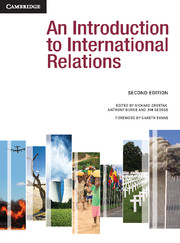Book contents
- Frontmatter
- Contents
- Tables, Figures and Boxes
- Contributors
- Preface and acknowledgements
- An Introduction to International Relations: The origins and changing agendas of a discipline
- 1 Theories of International Relations
- 1 International Relations Theory in an Age of Critical Diversity
- 2 Realism
- 3 Liberalism
- 4 Marxism and Critical Theory
- 5 Feminism
- 6 Postmodernism
- 7 Constructivism
- 8 Theories of Global Justice
- 2 The Traditional Agenda
- 3 The New Agenda
- Glossary of Terms
- Bibliography
- Index
- References
6 - Postmodernism
from 1 - Theories of International Relations
- Frontmatter
- Contents
- Tables, Figures and Boxes
- Contributors
- Preface and acknowledgements
- An Introduction to International Relations: The origins and changing agendas of a discipline
- 1 Theories of International Relations
- 1 International Relations Theory in an Age of Critical Diversity
- 2 Realism
- 3 Liberalism
- 4 Marxism and Critical Theory
- 5 Feminism
- 6 Postmodernism
- 7 Constructivism
- 8 Theories of Global Justice
- 2 The Traditional Agenda
- 3 The New Agenda
- Glossary of Terms
- Bibliography
- Index
- References
Summary
Introduction
This chapter offers an account of postmodernism. It begins by drawing a distinction between two broad approaches to the postmodern: one that outlines the contours of a new historical period (postmodernity), and another that places emphasis on finding new ways of understanding modern practices of knowledge and politics (postmodernism). The second part of the chapter examines how postmodern ideas entered international relations scholarship, and how the ensuing debates often had a strong polemical tone. Given the complexity of these debates and the limited space available here, my engagement in no way claims to be comprehensive. My objective is limited to identifying some of the key themes in postmodern thought so that interested readers can then explore the issues at stake if they wish to do so.
Before starting off it is useful to acknowledge that defining postmodernism is no easy task. Postmodern scholarship is characterised more by diversity than by a common set of beliefs. Add to this that the postmodern has become a very contentious label which is used less by its advocates and more by polemical critics who fear that embracing postmodern values would throw us into a dangerous nihilist void. But while the contours of the postmodern will always remain elusive and contested, the substantial issues that the respective debates have brought to the fore are important enough to warrant attention.
- Type
- Chapter
- Information
- An Introduction to International Relations , pp. 91 - 102Publisher: Cambridge University PressPrint publication year: 2011
References
- 1
- Cited by

